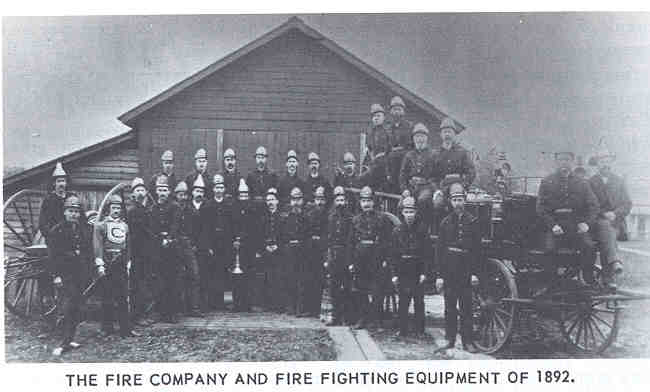
The fire company and fire fighting equipment of 1892.
to a television aerial and moved it to Route 24. The old bell is now stored at the city water plant, and proposals have been made to set it up in one of its original locations as a memento of the early days.
The old fire engine was in service for many years and was pulled by men or horses and sometimes both when needed. For some years Con Duff, the father of General Robinson E. Duff, mentioned in the Name and Fame chapter, operated a dray line and lived a block west of the fire house. His team was nearly always used to pull the engine to the fires, and the horses were so trained that Con would turn the team loose when the fire bell rang, and by the time the firemen arrived the horses were standing in their places waiting to be hitched to the engine.
The south half of Block 43 was destroyed by fire October 10, 1882. It began in the old El Paso House, a hotel where the theatre now stands. Gibson said he first built this building for a store and later changed it to a hotel, apparently as a concession to the Jenkins Bros. who opened their general store across the street that year. In addition to the hotel, then operated by Foreman Bros., sixteen other businesses were wiped out. These included: Geiger and Ingels, implements; S. D. Patton, sewing machines, pianos and organs; O. A. Cavan, Hall's safes; D. C. York, barber shop; Charles McCoy, drugs and books; Thomas Doyle, groceries; John Geiger, saloon; Saltzberger & Seidel, groceries; Carl Schuitman, restaurant, and the offices of P. C. Ransom, James Harper, Dr. J. Q. Adams and W. G. Randall, a lawyer.
This again emphasized the hazard of having wooden buildings heated with stoves standing wall to wall in the business area, as well as the inability of our fire fighting equipment to cope with a major fire. At the next city council meeting, an ordinance was passed forbidding the construction of business houses in Blocks 41, 42 and 43 unless built with brick walls and fire-resistant roofs.
Page 138